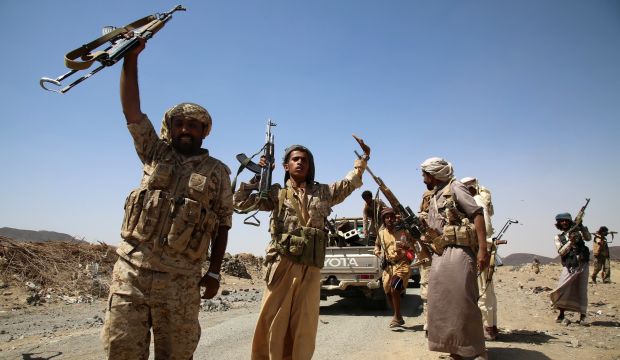
Armed Yemeni tribesmen from the Popular Resistance Committees, supporting forces loyal to Yemen’s Saudi-backed President Abd Rabbuh Mansur Hadi, jubilate on a road after seizing control of an area in Ma’rib province, east of the capital Sana’a, on October 5, 2015. (AFP PHOTO / ABDULLAH AL-QADRY)
UN spokesman Stephane Dujarric on Wednesday said Houthi rebels agreed to negotiate a settlement based on a seven-point peace plan proposed by the UN in talks in Oman last month.
The peace plan includes the implementation of UN resolution 2216 which demands the rebels put down their weapons and withdraw their militias from the areas they have seized in Yemen, including the capital, Sana’a.
Last year, an alliance of Iran-allied Houthis and supporters of ex-president Ali Abdullah Saleh seized Sana’a and forced the internationally recognized president to flee to the southern city of Aden and then to Saudi Arabia.
Saudi-led forces and government loyalists have in recent weeks retaken Aden, Yemen’s second city, and driven the Houthis and Saleh’s followers from major southern areas.
Dujarric said Ismail Ould Cheikh Ahmed, the UN envoy to Yemen, welcomed the Houthis’ acceptance of the resolution, urging all parties to the conflict to accept a UN invitation to join peace talks based on Security Council resolutions, an initiative by the Gulf Cooperation Council and the country’s National Dialogue.
Ould Cheikh Ahmed will visit the region soon to determine with the regional powers the date and location of the peace talks, the spokesman said.
Saleh’s General People’s Congress (GPC) party also accepted the plan and reiterated in a statement on Tuesday its “fast position on ending hostilities and … on a peaceful solution to Yemen’s crisis.”
Meanwhile, the Yemeni government said it welcomed the rebels’ acceptance of the UN resolution but demanded “concrete steps.”
In comments to Asharq Al-Awsat, Abdulaziz Al-Jabari, a Yemeni presidential adviser, said the government “heard about the acceptance of resolution 2216 by the Houthis who, if honest, must document their commitment at the UN headquarters.”
Jabari said: “The Yemeni presidency has not received any commitments from the Houthis so far regarding implementation of resolution 2216. We want concrete steps.”
Yemen’s Foreign Minister Riyadh Yassin told Asharq Al-Awsat that his government was prepared to deal positively with any peace proposal that could lead to the implementation of the UN resolution. But the FM said the Houthis must first take the practical measures required for the implementation of resolution 2216.
